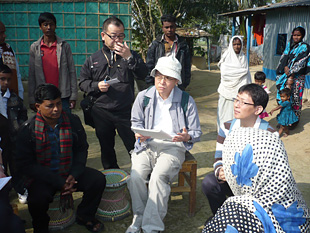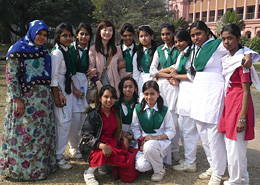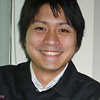Aiming to introduce solar-power generation in Bangladesh (Jan.25-Nov. 1)- PREX Island
PREX Members
Aiming to introduce solar-power generation in Bangladesh (Jan.25-Nov. 1)
Follow-up activity for seminar participants who have returned home to Bangladesh
As a follow-up activity for JICA’s Assistance Seminar for Introduction of Solar Power Generation, which was held for three years, a survey was held in the Dhaka district, which includes Bangladesh’s capital of Dhaka. The survey examined the state and plan of the introduction of solar power generation in Bangladesh, and in particular, efforts were implemented to confirm the collection, disposal and recycling states of storage batteries used in solar home systems (SHSs). We will report on how the seminar participants who have returned home tackled the project with enthusiasm and the state of the country’s introduction of solar power generation.

Interviews with families who own solar home systems
PREX was commissioned by JICA Kansai (called JICA Osaka until fiscal 2011) to implement the Basic Seminar to Introduce Solar Power Generation in the Asian Region in fiscal year 2009 and the “Assistance Seminar for Introduction Plan of Solar Power Generation” during a three-year period from fiscal years 2010 to 2012 (twice a year for three years). In fiscal 2011, a follow-up activity for the same seminars took place in Malawi, and more recently it took place from Jan. 25 to Feb. 1 in Bangladesh.
In its 2008 renewable energy policy, the country sets the objective of having renewable energy account for 5 percent of its electricity demand by 2015 and 10 percent by 2020. To achieve this objective, the country has been moving forward with the aggressive introduction of renewable energy, mainly through the efforts of the Ministry of Power, Energy and Mineral Resources.
Solar home systems (SHSs), which are used in regional electrification, currently account for a large portion of the country’s solar energy generation. SHS refers to a small-scale solar-power generation system with rechargeable batteries installed in the home in order to handle small amounts of power, such as several bars of compact fluorescent lights, a single black-and-white TV set or a portable recharger, etc., and 1.8 million of these systems are already installed in the country.
Activities are under way to make SHSs more widespread, with NGOs such as Grameen and BRAC using microfinance. Currently, an SHS penetration mechanism financed mainly by the Infrastructure Development Company Limited (IDCOL) is in place. Storage batteries are indispensible to SHSs, despite problems with their collection, disposal and recycling systems. A JICA specialist, a professor from Osaka City University and a representative of Hamada Co., Ltd., who served as lecturers for this seminar, conducted surveys together with us in the city of Dhaka.
When they questioned occupants of homes equipped with SHSs of various government institutions, IDCOL, NGOs and agricultural districts of Dhaka and storage battery manufacturers that recycle lead ingots, they highlighted a fear of electric shock if the exposed terminals of the batteries installed in the homes are touched, inadequate functioning of the collection system for used batteries and insufficient environmental and safety management of the battery recycling business, in particular during the initial disposal stage, compared with Japan.
As for the batteries’ collection and disassembly (the first stage of disposal), it was invariably impossible to observe the locations, as those duties were in the hands of the informal sector, and so we could only hear the comments of the people involved. Even so, we gained an understanding that the likelihood was fairly high that disposal is not being carried out in consideration of workers’ safety and the environment. Bangladesh is not alone; a large number of developing countries have issues with the batteries’ collection and proper disposal and recycling. We plan to compile a report based on the information acquired during this follow-up activity so that we can also utilize it in our future JICA seminars, along with giving feedback on proposals to the seminar participants who have returned to Bangladesh.
A glimpse of the future of Bangladeshi women
In the interludes between working through the schedule of each survey, I managed to observe at least one site of historical heritage! I used my break to go to Ahsan Manzil. Nicknamed the “Pink Palace,” this building was constructed as a facility for the French, although leading up to the country’s independence, it apparently had been used as a residence for the Nawab family, which ruled Dhaka at the time. There is a fee to enter the garden, but even so it was still filled with couples and students, as it seems to have become a spot for dates and relaxation for Dhaka’s residents.
Meanwhile, a dozen or so female junior high-school students crowded around me for some reason, and then we all took pictures. I guess they had wanted to speak English with a foreigner, but it showed the power of the female students. The country has a female prime minister, while in Bangladesh the improvement in women’s status is often raised as an issue. So I was able to get a sparkling look at the future of this country in the energy of its women.

The writer (fourth from the left) is surrounded by female junior high-school students at Ahsan Manzil.
company’s voice
 |
Representative Director of Hamada Co., Ltd. |
The main business of our company is the collection of industrial waste and intermediate disposal. We have talked mainly about this in the seminars. One of the company’s businesses, the collection, disposal, reuse and recycling of storage batteries, was once introduced to a seminar participant from a region without electrification. He was extremely interested, calling it “a technology necessary for my own country.”
In Japan, which naturally has electricity, battery reuse is not a technology that attracts much attention. In addition, there is a huge barrier here between “new items” and “secondhand items,” and the secondhand items usually don’t catch on. However, for regions without electrification, we now believe that this technology will become necessary.
But on paper, the argument in favor of acceptance in those other countries is gaining ground, based on market analyses and other perspectives, even though we don’t have any employees who are willing to go there and check it out. For our company, whose people and resources are spread around, it’s a situation that has us wondering whether this technology would really catch on in foreign countries. I feel that if we go overseas, then the English language would become an issue. If it’s only a problem of language study, we have already acquired women with Taiwanese nationality and human resources who have taken English courses. In terms of business, however, I imagine that a country’s culture, habits and business experience are essential.
Meanwhile, we participated with the support of PREX in field survey activities in Senegal and Ethiopia that were implemented by JICA in 2012. As for Senegal, I heard that JICA’s survey team is dispatched and so I made a young company employee take part. According to his report, he was welcomed wherever he went, and he seemed also to have been warmly welcomed everywhere, more than with other survey teams or local visits attended by trading companies. His acceptance is believed to have been due to JICA’s contributions to the local areas, it seems.
To date, 104 seminar participants from 39 countries have visited our company through PREX’s activities. We have been given the opportunity to accept the participants and go on local visits, renewing the acute sense of the value of our company’s technologies, which can be of use in developing countries. I hope we will be able to make a contribution with storage-battery reuse in regions without electrification.
- Date : January 25, 2013
- Name : Okumura International Department


